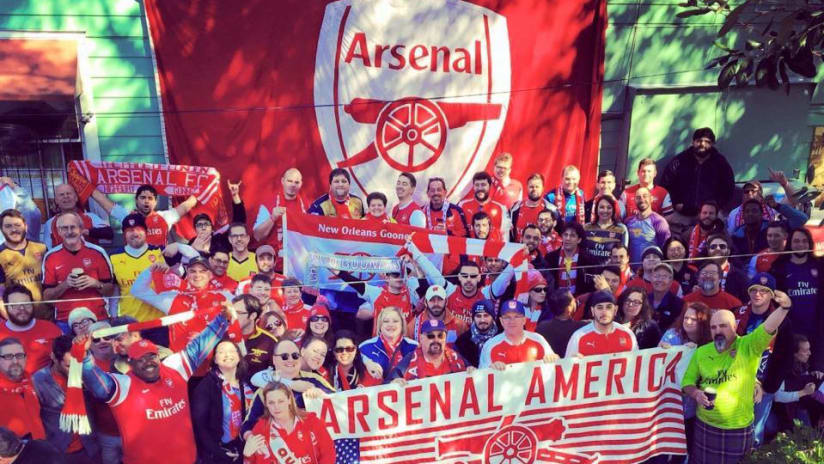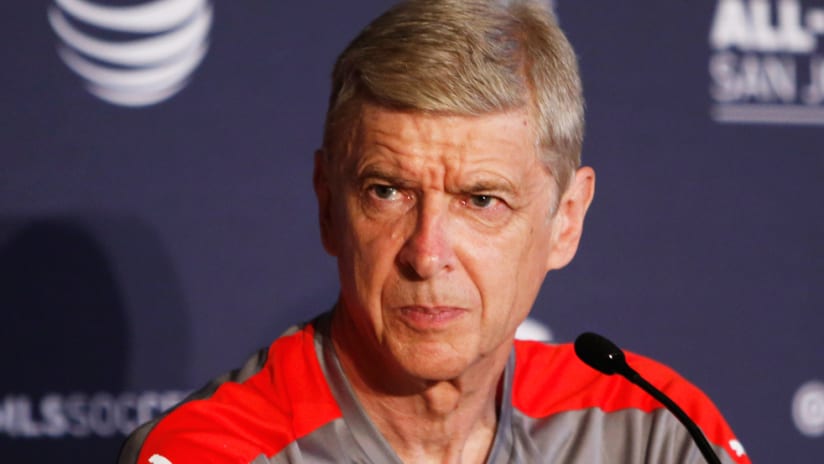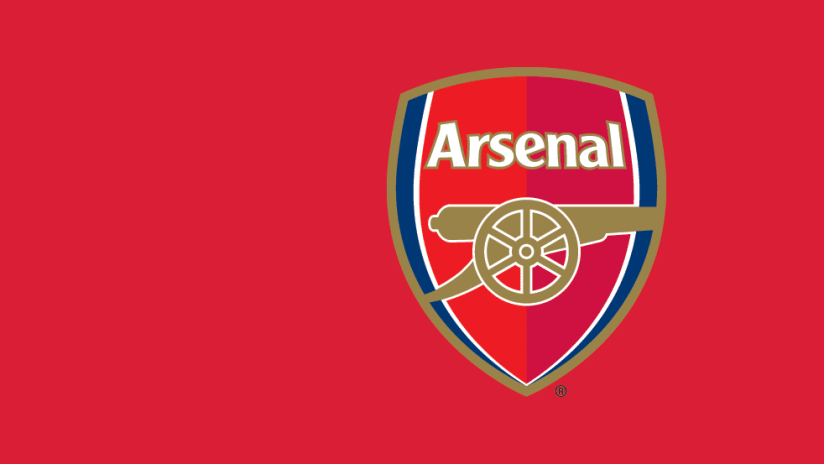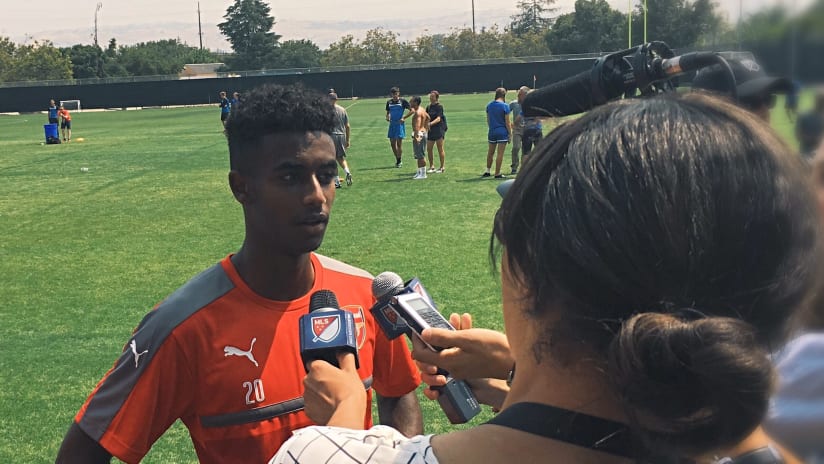On July 24, 2014, hordes of a red-and-white army descended on the City that Never Sleeps. It started with a pep rally at the Izod Center, just across the river from Manhattan in East Rutherford, New Jersey, with fans chanting boisterously until their heroes emerged from a makeshift tunnel, bathed in red lights and smoke.
The next day, the army crossed into the city and made for Grand Central Station, forming a snaking line for a moment (and a selfie) with a battle-won trophy. Later, bars along Fourteenth Street in Manhattan’s East Village hung banners (figurative and literal ones) welcoming the hundreds turning New York a distinct shade of red.
Then came Saturday afternoon. Hundreds gathered became thousands, filling trains and cars bound for Red Bull Arena. The devotees gathered for a long-anticipated moment of transcendence: the first game on American soil in 25 years for English Premier League club Arsenal. The match would pit their team against a New York Red Bulls side led by Arsenal legend Thierry Henry—and reveal just how deeply their support had taken root in the US.
The Red Bulls triumphed 1-0 in that friendly, with the lone goal resulting from a Henry corner kick scored by Bradley Wright-Phillips, son of Arsenal legend Ian Wright. Nevertheless, many of the Arsenal fans left the stadium happy, having experienced what they believed at the time would be a once-in-a-lifetime opportunity to see their team in their country.
Fast-forward two years, and Arsenal’s back in the US for Thursday night’s MLS All-Star Game at Avaya Stadium in San Jose, Calif. (7:30 pm ET on ESPN, UniMás, TSN, RDS). Their rapid return under these circumstances lends heft to something many football fans have felt anecdotally: Arsenal are quickly dwarfing other Premier League teams when it comes to popularity among the young-skewing, diverse soccer demographic that follows the EPL from the US.
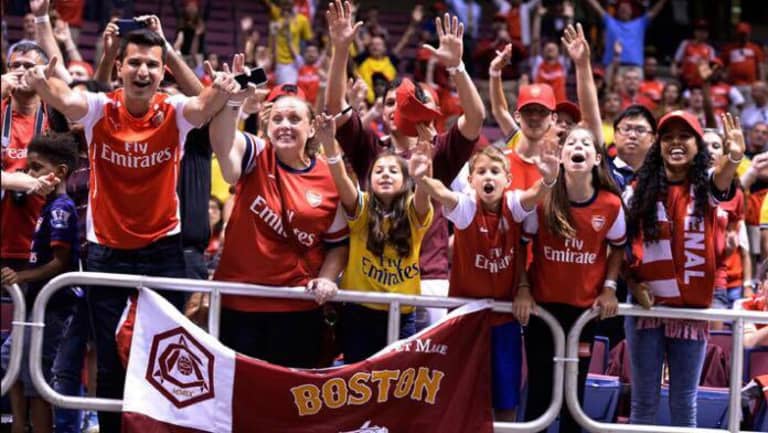
American Arsenal fans gather at a "pep rally" during the team's 2014 US tour. Image courtesy of Phil West
Arsenal Across America
The US census doesn’t yet ask for Premier League affiliations, but a few different measures place Arsenal at or near the top of American fan rankings for the top-flight English soccer league. Last year, for instance, Twitter determined that Arsenal boasted the most fans among its American and Canadian users, edging out Chelsea and Manchester United.
Chris Harris, managing editor of Arsenal Digital Group (which oversees the club’s online properties), reports that 3.36 million Americans make up 10 percent of the total worldwide audience for Arsenal’s web site. Their Facebook page, meanwhile, boasts more than 969,000 American likes. (While short of Manchester United’s 2.4 million and Chelsea’s 1.1 million American likes, it still tops Liverpool’s 663,000 and Manchester City’s 462,000.)
Some might even say there are too many American Arsenal fans (perhaps, especially, fans of their longtime rivals—and last year’s MLS All-Star opponents—Tottenham Hotspur). In an infamous Wall Street Journal article from June 2014 on American soccer fans, author Jonathan Clegg exaggerated this for effect: “For inexplicable reasons,” he wrote, “90 percent of soccer fans in the US seem to root for Arsenal.”
But Gooners, as they affectionately refer to themselves, don’t find the reasons inexplicable at all. For Premier League initiates wondering for whom to cheer, Arsenal fans offer a number of ready answers. The club’s rich, trophy-filled, 130-year history combines social media savvy among a friendly national network of fans and an aesthetically pleasing playing style (which extends, for some, to the EA SPORTS FIFA video game). It also offers the a unique identity for fans who like a bit of struggle—despite the centuries’ decorations, the team’s still seen as something of underdogs within the group of perennial powerhouses contending for the Premier League title each season.
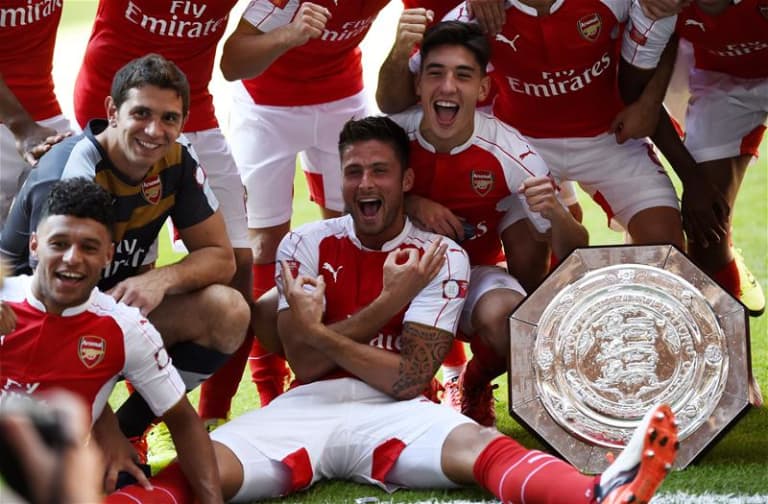
Arsenal with the FA Community Shield in 2015. Photo via Reuters Action Images
A History of Greatness
Premier League fans use trophies as a measure of success, and Arsenal’s racked up an impressive collection since the club’s founding in 1886. This includes 12 FA Cup titles, a record they share with Manchester United, as well as 13 league titles, topped only by Manchester United’s 20 and Liverpool’s 18.
The modern era gave fans “the Invincibles” squad, including Henry and current NYCFC head coach Patrick Vieira, who went 49 straight matches without a loss, a string including the entirety of the 2003-04 title-winning campaign. (That team also included Roanoke-born and -raised Danny Karbassiyoon, one of only three Americans to play for Arsenal; he recently released the memoir The Arsenal Yankee about the experience.)
Henry’s international star power during that run — and his subsequent arrival in MLS in 2010 — especially helped hook US supporters. Those included Jeremy Chasey, a fan in Pomona, California who would eventually take his participation to the next level.
In 2013, Chasey helped reorganize and revitalize Arsenal America, an organization of about 2000 superfans with a mission of connecting fans to each other and the club. This includes helping members get match tickets when they’re making the pilgrimage across the Atlantic to see Arsenal live, and supporting a number of branches around the nation that host watch parties at bars.
“Through working with the Orange County Gooners, it was clear that there were people showing interest in Arsenal, coming out to matches, and being a community,” Chasey said of his early efforts, starting with fan groups in Southern California. “We wanted this togetherness on the national level. We didn’t have any expectations or measurables at the outset; we just knew that we wanted to grow the community.”
Fellow Arsenal America board member Adrian Cazares, who also currently works for the LA Galaxy as a service executive, emphasizes the appeal of the real-life gatherings. “When you go to your local pub, and you meet the people that are an official representation of something bigger, you want to be a part of it,” he says. “When you engage with us, you get back something that can't be had by watching from home.”
Cazares also notes the overlap between his teams of choice, characterizing both the Arsenal and the Galaxy fans he works with as being extremely passionate about soccer. “It's really all about the love of the games,” he says. “Arsenal fans here in California will be at the pub at 4:30 a.m. to cheer on our fans. My Galaxy clients are among the first in the gates for every home match.”
American Arsenal fans, meanwhile, are increasingly gathering around events beyond games. The usual pub watch parties have recently spawned even bigger regional fan-gathering events unrivaled by those of other American supporters groups for Premier League teams.
The best of these might be Gooner Gras, created in 2014 by the Krewe of Arsenal. The tight-knit New Orleans fan group grew from a small gathering of fans at Finn McCool’s, the city’s most beloved soccer bar, for the 2010-11 Arsenal season opener.
Their annual event centers around an Arsenal watch party and the bawdy Mardi Gras-kickoff Krewe du Vieux parade. As it’s grown from 50 attendees from the Gulf States in its first year to nearly 200 last year, it’s also expanded to include fantastic eating and drinking fests and the crowning of a king and queen. (It’s not just for American fans, either — the 2015 edition included attendees from Canada and even England.)
“We just started Gooner Gras on a whim,” says Ally Dever, who along with her partner of 21 years (and wife since 2014), Jill Spragio, are the self-described “aunts” of the Krewe of Arsenal. They met on a blind date and started following soccer together in 2009.
Dever gravitated to Arsenal from the get-go because of how they play: a midfield-dependent, pass-happy style of play that puts the beautiful in “beautiful game.” Spragio says, by contrast, “I started with Newcastle, because they had a beer, but then realized that was a poor choice.”
They’re not the only couple to anchor a local chapter — David and Lorrie Ziegler founded Alamo City Arsenal in 2014, building a San Antonio audience from five fans to one of the largest and most active Arsenal fan groups in Texas.
They met online and had their first date in February 2011 — or as David romantically remembers it, “the day that we took a 4-0 lead on Newcastle and ended up drawing 4-4.” In a pre-date email to work out logistics, David went into great, pained detail about the match. Lorrie wasn’t even a soccer fan at the time, but she remembers, “I could feel his pain and frustration, as a lifelong New Orleans Saints fan, so I got it.”
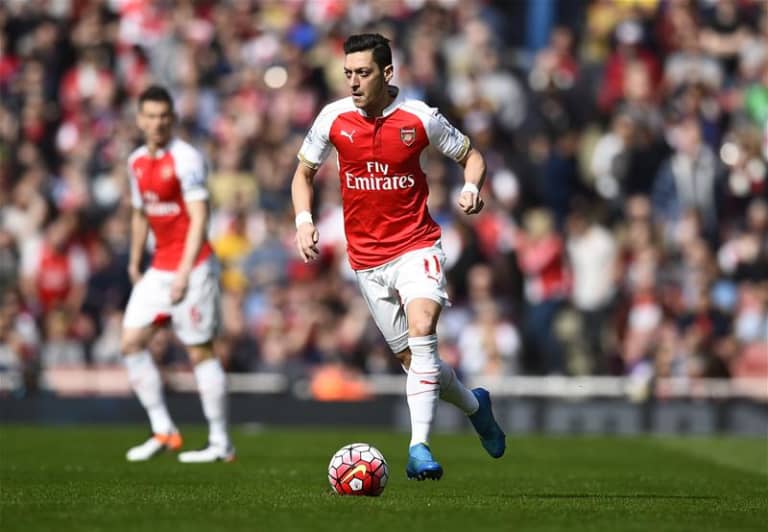
Mesut Ozil at work on the pitch. Photo via Reuters Action Images
About the Aesthetics
If they’re not brought into the fold by romantic partners or friends, many American fans note getting hooked on Arsenal’s style of play.
“There's something to be said about being the flag-bearers for playing ‘beautiful football,” says New York City-based fan Kirby Gargantiel, an Arsenal supporter since meeting the club’s now-assistant manager Steve Bould in an airport in 1997. “When a team presents a more entertaining style of play paired with being perennial contenders, I think the casual fan gravitates towards that.”
Today, Arsenal’s brand of soccer hinges on contributions from two of the team’s biggest recent signings. There’s Mesut Ozil, who came over from Real Madrid in 2013, and who Arsenal fans like to tout as the best No. 10 in the world. There’s also Alexis Sanchez, the Chilean international who led Chile to back-to-back Copa America titles, and who came over from Barcelona in 2014.
For American soccer fans crossing over from basketball, Ozil’s reminiscent of an elite point guard who thrives in fast breaks and can set up multiple teammates with passes that best highlight their strengths. There’s even one Ozil-to-Alexis goal, from last year’s 5-2 win at Leicester, that is as close to an alley-oop dunk as you’ll get in soccer.
McNamara feels Arsenal is particularly appealing to American fans because it’s a “[It’s a] higher caliber of teamwork and interplay, that you see in only a select few club teams,” says Joel McNamara, who’s co-hosted the Arsenal Review USA podcast since 2009.
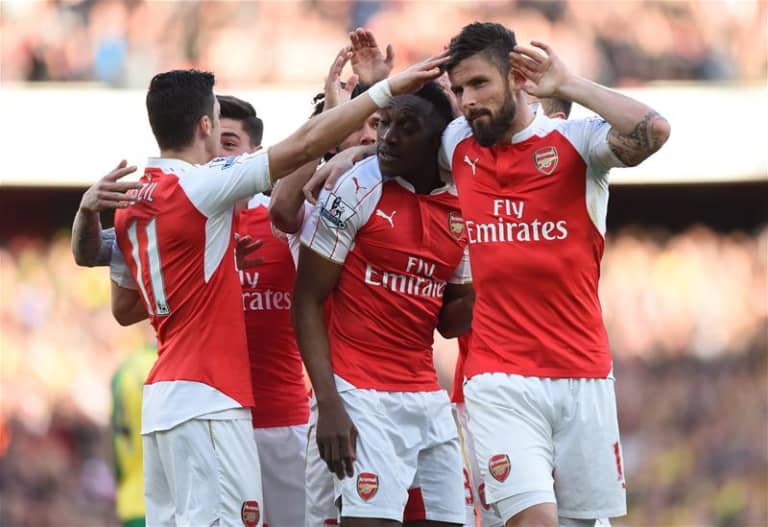
The first-teamers represent an international bunch. Photo via Reuters Action Images
Diversity in Dividends
The playing style is part of an overall culture at Arsenal that many credit to longtime manager Arsene Wenger, who took over the club in the fall of 1996. At one point last season, he’d spent more time in his current post than the other 19 Premier League managers combined.
Particularly appealing in the US is how Wenger has built a squad of diverse international players. The current first team he’s assembled is a veritable United Nations, with players representing 15 different nations and four continents. While French, English, and German players make up the bulk of the roster, the team also includes players from nations not often represented in the Premier League, like Costa Rica, Egypt, and Nigeria.
Besides an international flavor to Arsenal’s lineup, there’s also a cosmopolitan quality to their London home. It all contributes to a progressive flavor and an inclusiveness in Arsenal’s communications with fans that give the sense Arsenal is about more than just fielding a good team.
The September 2014 video the team made for the anti-homophobia Rainbow Laces campaign, for instance, features team members playfully showcasing their public personas and perceptions about them to support the cause. The team also regularly takes to social media to reach out to specific groups of fans, wishing Muslim fans a Happy Eid and American fans a Happy Fourth of July.
“I definitely see an effort from Arsenal to be more open to fans of different ethnicities and backgrounds, and I appreciate that,” says Dili Yang, a branch manager of the Chicago Gooners. She found the team through research for a Champions League fantasy league she and her roommate created in 2010. She stayed hooked when she realized the club’s conscientiousness.
Yang also notes that some members of the Chicago Gooners take particular pride in the fact that it’s led by a woman. “They’ll say, ‘Yeah, Dili’s in charge, and she can probably do more shots than you,’” she says, laughing.
She credits both Arsenal fans themselves and the culture at the Chicago Gooners’ home pub, the legendary Globe, for being so welcoming. She, in turn, has done her part to bring new fans in. In a recent membership drive, she led efforts to recruit the most Arsenal America fans of any chapter, earning Chicago Gooners the right to have their banner hung in Emirates Stadium for part of last season.
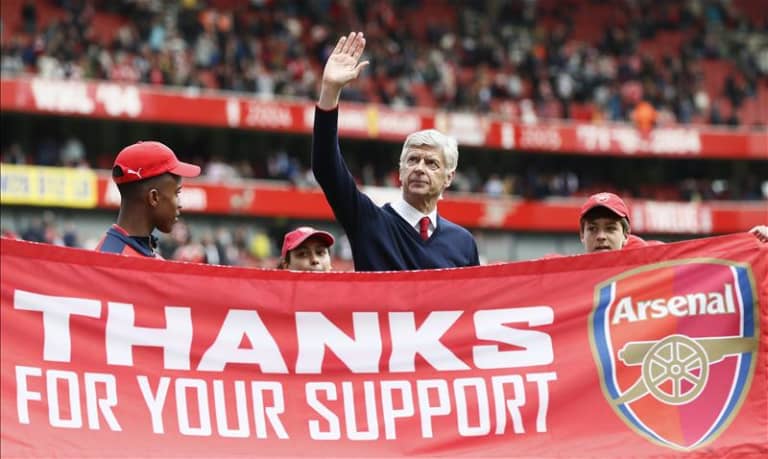
Wenger thanks the fans in May 2016. Photo via Reuters Action Images
Top Dogs and Underdogs
There’s yet another aspect of the Arsenal image that continues to draw fans on our shores: their perceived underdog status. Americans love an ostensible underdog, don’t they?
“Underdog,” here, requires some context. Since 2011, the team’s majority shareholder has been an American: Stan Kroenke, who also owns the Colorado Rapids and three other Denver-based pro sports franchises, as well as the NFL’s Los Angeles Rams. That means that financially speaking, Arsenal is a big fish in a big pond. A Forbes report from this past May declared the club as the fifth most valuable in the world, only outranked by Real Madrid, Barcelona, Manchester United, and Bayern Munich.
And yet there remains perception that Arsenal, at least among the Premier League’s top tier of teams, still have something to prove. It’s tied largely to the impression that rivals — from longtime foes like Man U and Liverpool, along with Chelsea and Man City — are willing to spend money on players with more frequency and more alacrity than Arsenal.
Some Arsenal fans perceive the team’s approach, dating back to Wenger’s earliest days with the club, as building rather than buying the title, and they see it as the more honorable route.
“I think when most of the early adopters got into the game over here in the late 1990s and early 2000s, it was basically a choice between Arsenal and United, and plenty didn’t want to be seen as a bandwagoning, glory-hunting dunce who just picked the club that seemingly won the league by default,” says Marshall Doig, copy chief for the soccer magazine Howler. “Arsenal was a good choice because it was able to challenge United for supremacy, but wasn’t the insufferable bully on the block.”
An American sports analogy that Chasey finds useful is the San Antonio Spurs. Similarly, their strong identity comes from a team-based, egoless system, a history of successes (though not recent enough for its fans’ liking), and a coach whose stubbornness and sometimes testy, sometimes playful relationship with media makes him much admired by fans.
Arsenal fans who follow MLS might be reminded of the 2015 edition of the Portland Timbers and their cohesive team play and joyous spirit. Or, they might be reminded of the hard-nosed, but ultimately hard-luck, 2014 edition of the New England Revolution, who missed out on a first title that year, in a fifth MLS Cup against a star-studded Galaxy lineup.
Last summer, Arsenal was the only team in the top five European leagues not to sign an outfield player during the transfer window, and the team’s reluctance to get into an arms race with other top clubs rankles some fans. Arsenal hasn’t won the English league— the ultimate measure of success for a top-tier club — since the magical 2003-4 season.
“We have this recent tradition of being first at Christmas or into the spring, and then injuries and a bad run of performances knocks the team back to third or fourth,” says Richmond Gooners branch manager Tom Rosenhammer. “Again and again and again, we are tantalized.”
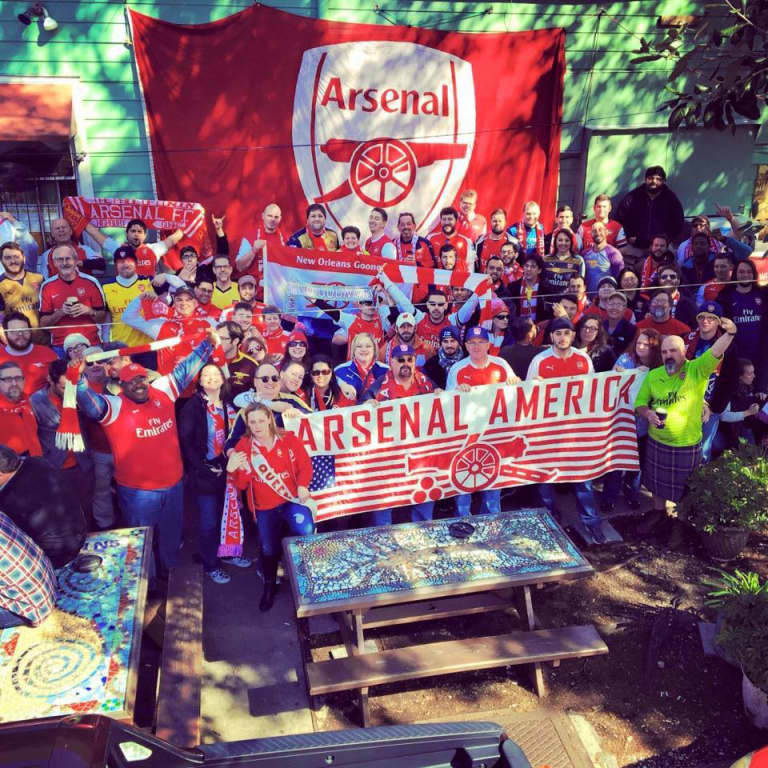
American Arsenal fans celebrate at Gooner Gras 2016. Photo courtesy of Phil West
Love Is All Around
Ultimately, most American fans feel the rewards of Arsenal fandom trump its frustrations. “Having been to a number of Arsenal America pubs throughout the country for matchday festivities,” says Alexander Adkins of Poughkeepsie, New York, “we all seem to share a collective mentality that we are in this together.”
Last season, the team finished second in the Premier League and actually beat league champions Leicester City in both their matches against them. And to make things more interesting, Jose Mourinho, the manager who’s had a deliciously contentious relationship with Wenger in recent years, has moved from hated Chelsea to equally hated Manchester United.
Arsenal fans have gone into recent seasons with a complicated mix of optimism, concern, and dread, and this season will be no exception. The team’s chief executive, Ivan Gazidis, declared last Friday to media that the current version of Arsenal is good enough to win the league, touting the spend-wisely rather than spend-lots philosophy.
But this week, for Arsenal's American fans gathering in San Jose, it will be a chance to celebrate, to witness players who may figure into a successful campaign that could lead to silverware, and to capture some of the togetherness and revelry that fans found on the other coast two years ago. For many with MLS allegiances, it’s a chance to witness how the best of MLS fares against their chosen team. Regardless of the result on the field, everyone leaves with some kind of victory.

